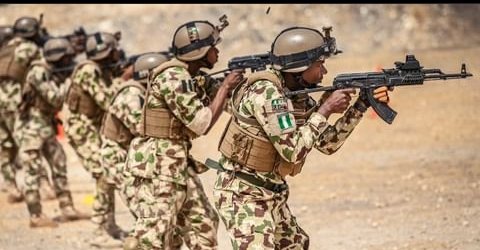In a significant development for Nigeria’s ongoing battle against insurgency, the Chief of Defence Staff (CDS), General Christopher Musa, has announced that nearly 200,000 repentant terrorists have surrendered their weapons in the North East. The announcement marks a key milestone in the fight against terrorism, underscoring the success of both military operations and non-violent strategies used to address the nation’s security challenges.
Speaking at the Security and Justice Symposium held in Abuja, General Musa revealed that the combined efforts of kinetic and non-kinetic strategies have played a crucial role in facilitating this dramatic shift among insurgents.
“We are conducting both kinetic and non-kinetic operations, which have led to significant successes. We want to thank the National Security Adviser for the support we’ve received,” General Musa stated during the event.
The symposium, which was organized by the Office of the National Security Adviser (ONSA) in collaboration with the British High Commission, focused on key issues surrounding the security situation in the country. General Musa’s speech highlighted that although kinetic actions – such as military strikes – remain important, it is the non-kinetic efforts that have truly helped in turning the tide.
“The kinetic aspect is just less than 30%. The non-kinetic has a lot to play,” he said. This refers to non-violent methods such as dialogue, rehabilitation, and addressing the root causes of insurgency. For General Musa, the combination of these approaches has helped to foster trust, reduce grievances, and encourage insurgents to reconsider their involvement in terrorism.
One of the key challenges identified by the CDS in his address was the persistent threat of Improvised Explosive Devices (IEDs), which have posed significant risks to troops and civilians. He explained that terrorists often use IEDs as their primary weapon, making them particularly difficult to combat.
“IEDs have been the major challenge since the beginning of the insurgency,” General Musa explained. “We are constantly looking for creative and innovative ways to handle this challenge. Our success in denying insurgents logistics and support has been crucial.”
While significant progress has been made, General Musa also pointed out that logistical support for the terrorists remains a critical challenge. He stressed the importance of identifying the sources of funding and supplies that fuel insurgent operations.
“Those supporting the terrorists by giving them logistics – we have to look for the oxygen. Where is the funding coming from? How are they getting the logistics across?” he asked. The CDS highlighted that without these external supports, insurgents would not have the capacity to continue their activities.
The role of communication in counter-insurgency efforts was another key theme in the CDS’s remarks. General Musa emphasized the importance of informing the public about the progress being made and ensuring that the perception of the military’s efforts aligns with the reality on the ground.
“Many of the terrorists are realising the fruitlessness of what they are doing and are retracing their steps,” he noted. However, he warned that asymmetrical warfare tactics – such as those used by terrorists – require constant innovation and adaptability in counter-measures.
General Musa also called for greater cooperation with Nigeria’s international partners, particularly neighbouring countries, which play a vital role in addressing the cross-border nature of insurgency. He acknowledged the support of regional forces and emphasized that Nigeria’s security challenges cannot be solved in isolation.
“We cannot work in isolation as a country. We need our international partners working together with us,” he said. This sentiment was echoed by the National Security Adviser, Mallam Nuhu Ribadu, who also addressed the symposium, emphasizing the importance of unity among security agencies and international partners in tackling the issue of terrorism.
“The objective of the Security and Justice Symposium is to delve into the successes, challenges, and opportunities for growth within our security and justice institutions,” Ribadu remarked. He highlighted that one of the key goals is to enhance the protection of civilians and promote accountability within security operations.
As part of efforts to ensure that insurgents who surrender are reintegrated into society, the Nigerian government has been working on rehabilitation programs aimed at providing ex-terrorists with a path to reintegration. General Musa’s announcement of 200,000 surrenders represents a major achievement in this regard. However, there is still a long road ahead.
While the number of surrenders is promising, Nigeria continues to face ongoing security threats, including terrorism, banditry, and armed clashes in various parts of the country. The government’s dual strategy of kinetic military action and non-kinetic efforts, including dialogue and development programs, will need continued support from both local and international partners.

